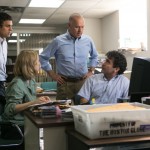Watanabe (Takashi Shimura), the protagonist of Kurosawa’s film, has spent most of his life living as the polar opposite of George Bailey. Early on, he is described as “a corpse,” “dead for 20 years.” His nickname at the government office where he works is “the Mummy.” He is “worn down by bureaucracy and busyness,” and never eats anything for lunch except “plain noodle soup.” He is a cog in the bureaucratic machine, a machine in which simple community problems are not dealt with but are passed around from office to office, as government employees all try to avoid breaking up their endless pursuit of forms and regulations with an episode of actually accomplishing anything. (As an aside, the film seemed to be an excellent apologetic for the conservatism that believes government tends to naturally introduce complication and waste into almost any situation, a conservatism that says that the worst phrase you can hear is “I am from the government, and I am here to help you.”)
Early in the film, we meet a group of desperate mothers who are terribly worried about raw sewage lying open and attracting mosquitoes and posing community danger, a group who comes to lobby Watanabe’s office for help. They are bounced from office to office to office in a maddening circle. No one does anything for them. They are angry and beside themselves with worry. They only want some sort of simple solution, some help to make their community safe for their children. Is that too much to ask? Watanabe is part of the buck-passing initially, but all that will change as time goes on.
When he discovers that he has stomach cancer that will kill him in around six months, Watanabe is shaken to his core. Initially, he is tempted to commit suicide. Then he decides against it but tries drinking and revelry to ease the pain. It does not really satisfy. He is drawn to a young woman who used to work in his office; she is very young and light and bright and playful. He loves her company but seems all too needy and the age difference is too much for her; she tries to be kind but keeps recoiling from him in revulsion. She inspires him to change, however, and to seek joy and purpose in life. At one point, he says to her, “Why are you so incredibly alive?”
A turning point comes in the film when it dawns on Watanabe that it is not too late for him and that he will do something to make a difference in the world. At this moment, subtly in the background, we hear a quiet rendition of “Happy Birthday to You” being sung in English. We are to see this moment as Watanabe’s rebirth. It is not unlike George Bailey having his eyes opened and crying out, “I wanna live again, Clarence!” Suddenly, everything in each man’s life is seen through fresh eyes. Everything that was a burden before becomes a joy and blessing. Everything that was a barrier becomes a place to live out vocation in service to the neighbor.
Watanabe decides to help those mothers who sought the government’s help to deal with the terrible sewage in their community. He doggedly pursues a resolution, standing with resolute confidence, not giving up until their need is met. He sees to it that the sewage is cleaned up and park built on the spot. When Watanabe dies a little past midway into the film, these women (and a local policeman) are the only people who come to the wake with a genuine, heartfelt grief, shocking everyone (and especially Watanabe’s cold and distant son, Mitsuo, and his son’s wife) with their earnestness.
His example goes on to inspire his fellow bureaucrats, though the film leaves us to draw our own conclusions as to whether they will follow through on their dramatic statements such as this one, made at Watanabe’s wake: “I’ll work at it [at making a difference despite bureaucracy] like a man reborn!” Kurosawa may well have left the ending ambiguous in order to help us, the audience, realize we too stand on the brink of decision. Will we be a corpse, a mummy, going through the motions of life, or will we choose “to live” a real life, serving our neighbors and making a difference in their lives?












